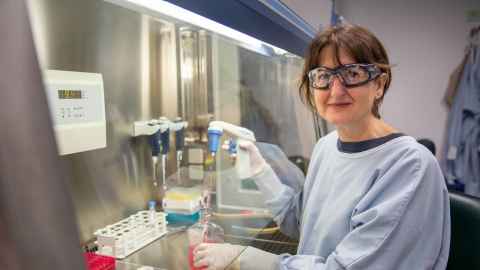Take 10 with... Jo Perry
Associate Professor Jo Perry explains her research into the role of hormones in cancer, and her hopes for an eventual clinical application to improve treatment.

1. Describe your research topic to us in 10 words or less.
Developing new strategies to treat cancer.
2. Now describe it in everyday terms!
I’m interested in how hormones contribute to cancer and cancer progression, and how they may be fuelling or increasing tumour growth. Much of the research we do focuses on one of our key hormones, growth hormone, which is essential for normal growth and development but is also found in some cancers. One of the fascinating aspects of this hormone is that humans and animals born with a defect in the growth hormone axis have quite a remarkable reduction in cancer incidence. Our research has shown that this abnormal production of growth hormone by tumours may reduce the effectiveness of certain drugs and therapies used to treat cancer. An important part of the work involves developing drugs that are designed to block growth hormone actions.
3. What are some of the day-to-day research activities you carry out?
Much of our work is pre-clinical and based in the laboratory. We grow cancer cells in culture dishes in an incubator and we use them to test the compounds that we’re developing to see if they inhibit the growth of the cancer cells. By combining these compounds with clinically used anti-cancer drugs or radiation therapy we can test whether they improve the efficiency of these therapies. We also carry out a lot of cell and molecular biology work to understand how growth hormone affects cancer cell characteristics and aggressiveness, and whether the drugs that we’re developing impact on that.
4. What do you enjoy most about your research?
The excitement of identifying something new, but most importantly the potential that our research might contribute to a treatment that benefits patients with cancer. This point in particular regularly keeps me up at night. Although the work that we’re doing is still at an early stage in the discovery process, the potential that it might translate into a treatment that is used in clinical practice and helps patients is a strong motivation.
5. How have you approached any challenges you’ve faced in your research?
Persistence. Persistence and patience are critical in a lab-based research career. You have to accept that not everything is going to work in the lab, which is harder to do when you first start out. It can take time to work through experimental issues and resolve them and this process can be repetitive and frustrating, but it’s an important part of the learning process. Constant critique and revision of experimental processes, design and working hypotheses is an important part of the work. Perseverance is also key for publishing and obtaining research funding.
6. What questions have emerged as a result?
We still haven’t completely answered one of the main questions that we started out with: whether a growth hormone receptor antagonist is going to be useful as a cancer therapy and whether it will improve radiation therapy. Early promising work in the lab showed that when you add a growth hormone receptor inhibitor to radiotherapy, there are improved outcomes in terms of reduced tumour growth, and we’re really interested in why this occurs. However, soon after this we weren’t able to access the drug that is commonly used in clinical practice or carry out the follow-up experiments we had planned. It meant that our next questions was: can we make an in-house version of drug ourselves and can we improve on it? This was born out of necessity, but this change in research direction meant that we’ve been able to make an improved version of the drug– it’s got higher activity and is more effective as a result of the changes we’ve made. As a result we’ve also developed a range of new methodology and capacity in the lab which we didn’t have before. We’re also developing novel growth hormone blocking drugs that act in different ways to the clinically used inhibitor, including small molecule compounds. We anticipate these will have more favourable characteristics and the project is progressing really well.
8. What impact is your research having or what impact do you hope it will have?
I would like to see this work eventually translated through to a clinical application, however there’s a lot of work to be done in the meantime. We’re at the stage where we’ve got the drugs that we’re interested in taking forward and now we need to test them in the lab to see if they’re going to be useful before we even think about clinical trials. Our particular interest is breast cancer but there may also be application for endometrial and other cancers for which this hormone has demonstrated effects.
8. If you collaborate across the University, or outside the University, who do you work with and how does it benefit your research?
Collaboration is essential for this work – particularly the drug discovery aspect. Across the University I collaborate with researchers at the Auckland Cancer Society Research Centre and in the Faculty of Medical and Health Sciences. They are a key part of the team and are involved in the drug development and radiation therapy side of the research. I also have collaborators overseas who’ve been in involved in drug development. Collaborators at UCLA were key to making our in-house version of the clinically used growth hormone receptor inhibitor.
9. What one piece of advice would you give your younger, less experienced research self?
Focus on the projects you are passionate about and pay particular attention to unexpected results as those are often the most interesting.